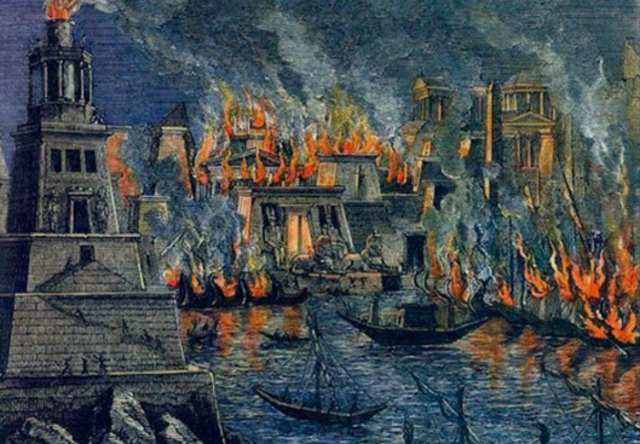The Library of Alexandria was one of the most significant libraries of the ancient world, housing a vast collection of knowledge and literature from various civilizations. Unfortunately, this great library was destroyed, and the exact cause of its destruction remains a mystery. However, the most popular theory is that it was burned down during a war between Julius Caesar and the Egyptians in 48 BC.
The Library of Alexandria: A Brief History

The Library of Alexandria was founded by Ptolemy I Soter, one of Alexander the Great's generals, in the third century BC. The library was part of the larger Museum of Alexandria, which was a center of learning and research in the ancient world. The library's collection was vast, containing hundreds of thousands of papyrus scrolls, books, and manuscripts from various civilizations, including Greek, Roman, Persian, and Egyptian.
The library was not only a repository of knowledge but also a center of intellectual activity. Scholars from all over the world traveled to Alexandria to study and exchange ideas. The library was also a place where new works were written, edited, and copied.
The Burning of the Library of Alexandria
The exact cause of the library's destruction is unknown, and historians have put forth several theories. The most popular theory is that the library was burned down by Julius Caesar during his war with the Egyptians in 48 BC. According to the Roman historian Plutarch, Caesar accidentally set fire to the library when he was trying to burn down the Egyptian fleet in the harbor.
Another theory suggests that the library was destroyed during the Muslim conquest of Egypt in the seventh century. According to this theory, the Muslim general Amr ibn al-As ordered the library's destruction because he believed that the books were either already in the Quran or contradicted its teachings.
The Tragic Loss of Knowledge

Regardless of how the library was destroyed, the loss of its collection of knowledge is considered one of the greatest tragedies in human history. The destruction of the library resulted in the loss of countless works of literature, philosophy, science, and art. Many of these works were unique and existed nowhere else in the world.
The loss of the library's collection set back the progress of human knowledge and civilization by centuries. It is impossible to know how much knowledge was lost, but it is estimated that the library contained between 40,000 and 400,000 scrolls, books, and manuscripts.
The Legacy of the Library of Alexandria

The library's destruction was a great loss to human civilization, but its legacy lives on. The library inspired the creation of other great libraries throughout history, such as the Library of Congress in the United States and the British Library in the United Kingdom.
The library's legacy also lives on through the work of scholars and researchers who continue to study and preserve ancient texts and knowledge. The loss of the library's collection is a reminder of the importance of preserving and protecting our cultural heritage and the knowledge of past civilizations.
Conclusion
The burning of the Library of Alexandria was a tragic loss of knowledge and a setback for human civilization. The library was a center of learning and intellectual activity in the ancient world, housing a vast collection of knowledge and literature from various civilizations. Its destruction resulted in the loss of countless works of literature, philosophy, science, and art. However, the library's legacy lives on through the work of scholars and researchers who continue to study and preserve ancient texts and knowledge.